 W
WThe Arrow of Gold is a novel by Joseph Conrad, published in 1919. It was originally titled "The Laugh" and published serially in Lloyd's Magazine from December 1918 to February 1920. The story is set in Marseille in the 1870s during the Third Carlist War. The characters of the novel are supporters of the Spanish Pretender Carlos, Duke of Madrid. Curiously, the novel features a person referred to as "Lord X", whose activities as arms smuggler resemble those of the Carlist politician Tirso de Olazábal y Lardizábal, Count of Arbelaiz.
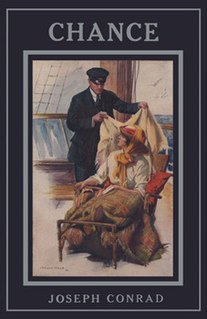 W
WChance is a novel by Joseph Conrad, published in 1913, following serial publication the previous year. Although the novel was not one upon which Conrad's later critical reputation was to depend, it was his greatest commercial success upon initial publication.
 W
WHeart of Darkness (1899) is a novella by Polish-English novelist Joseph Conrad about a narrated voyage up the Congo River into the Congo Free State in the Heart of Africa. Charles Marlow, the narrator, tells his story to friends aboard a boat anchored on the River Thames. This setting provides the frame for Marlow's story of his obsession with the successful ivory trader Kurtz. Conrad offers parallels between London and Africa as places of darkness.
 W
WThe Inheritors: An Extravagant Story (1901) is a quasi-science fiction novel on which Ford Madox Ford and Joseph Conrad collaborated. Written before the first World War, its themes of corruption and the effect of the 20th century on British aristocracy were prescient. It was first published in London by William Heinemann and later the same year in New York by McClure, Phillips and Company.
 W
WLord Jim is a novel by Joseph Conrad originally published as a serial in Blackwood's Magazine from October 1899 to November 1900. An early and primary event in the story is the abandonment of a passenger ship in distress by its crew, including a young British seaman named Jim. He is publicly censured for this action and the novel follows his later attempts at coming to terms with himself and his past.
 W
WThe Nature of a Crime is a collaborative novel written and published in 1909 by authors Joseph Conrad and Ford Madox Ford. The text did not acquire acclaim until after Conrad's death in 1924, when Ford brought the text to light in his essay "Joseph Conrad: A Personal Remembrance". The Nature of a Crime is the last of three books written by Conrad and Ford.
 W
WThe Nigger of the 'Narcissus': A Tale of the Forecastle is an 1897 novella by Joseph Conrad. Because of its superb quality compared to earlier works, some critics have described it as marking the start of Conrad's major or middle period; others have placed it as the best work of his early period.
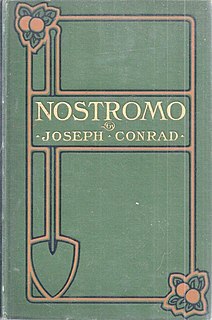 W
WNostromo: A Tale of the Seaboard is a 1904 novel by Joseph Conrad, set in the fictitious South American republic of "Costaguana". It was originally published serially in two volumes of T.P.'s Weekly.
 W
WAn Outcast of the Islands is the second novel by Joseph Conrad, published in 1896, inspired by Conrad's experience as mate of a steamer, the Vidar.
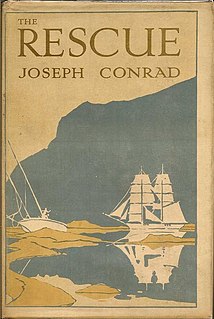 W
WThe Rescue, A Romance of the Shallows (1920) is one of Joseph Conrad's works contained in what is now sometimes called the Lingard Trilogy, a group of novels based on Conrad's experience as mate on the steamer Vidar. Although it was the last of the three novels to be published, after Almayer's Folly (1895) and An Outcast of the Islands (1896), the events related in the novel precede those. The story follows Captain Tom Lingard, the recurring protagonist of The Lingard Trilogy, who was on his way to help a native friend regain his land when he falls in love with a married woman whose yacht he saves from foundering.
 W
WRomance is a novel written by Joseph Conrad and Ford Madox Ford. It was the second of their three collaborations. Romance was eventually published by Smith, Elder & Co. in London in 1903 and by McClure, Phillips and Company in New York in March 1904.
 W
WThe Rover is the last complete novel by Joseph Conrad, written between 1921 and 1922. It was first published in 1923, and adapted into the 1967 film of the same name
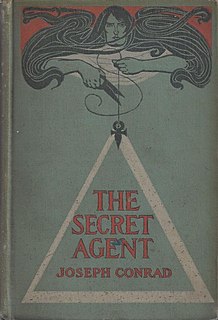 W
WThe Secret Agent: A Simple Tale is a novel by Joseph Conrad, first published in 1907. The story is set in London in 1886 and deals with Mr Adolf Verloc and his work as a spy for an unnamed country. The Secret Agent is one of Conrad's later political novels in which he moved away from his former tales of seafaring. The novel is dedicated to H. G. Wells and deals broadly with anarchism, espionage and terrorism. It also deals with exploitation of the vulnerable in Verloc's relationship with his brother-in-law Stevie, who has a learning difficulty. Conrad’s gloomy portrait of London depicted in the novel was influenced by Charles Dickens’ Bleak House.
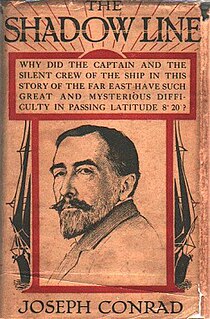 W
WThe Shadow-Line is a short novel based at sea by Joseph Conrad; it is one of his later works, being written from February to December 1915. It was first published in 1916 as a serial in New York's Metropolitan Magazine (September—October) in the English Review and published in book form in 1917 in the UK (March) and America (April). The novella depicts the development of a young man upon taking a captaincy in the Orient, with the shadow line of the title representing the threshold of this development.
 W
WTyphoon is a short novel by Joseph Conrad, begun in 1899 and serialized in Pall Mall Magazine in January–March 1902. Its first book publication was in New York by Putnam in 1902; it was also published in Britain in Typhoon and Other Stories by Heinemann in 1903.
 W
WVictory is a psychological novel by Joseph Conrad first published in 1915, through which Conrad achieved "popular success." The New York Times, however, called it "an uneven book" and "more open to criticism than most of Mr. Conrad's best work."